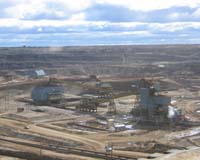 |
Miami (UPI) May 22, 2009 Venezuelan state energy company PDVSA has announced it would take control of nearly three dozen oil contractors as part of a new law governing the sector. The changes mark the latest effort by President Hugo Chavez to cut costs across the board for Petroleos de Venezuela SA amid increasing concerns about falling revenue due to a decrease in oil prices over the last year. The law calls for the takeover of 35 oil service and transport providers, according to PDVSA officials. Those operations, said officials, will be evaluated in the coming weeks to determine whether the state-run energy firm will continue to control the operations over the long term. The takeover has affected both local and foreign service providers who balked at the takeover saying the Venezuelan government owed them billions of dollars in outstanding payments for services rendered. The Venezuelan government said the contracts negotiated by the contractors were negotiated when oil prices were nearing record highs. Earlier this week, following the announcement of the takeover, Venezuelan Economic Minister Al Rodriguez said the country's oil revenue had been cut by nearly 60 percent in the last 10 months compared with the same period in 2007-2008 because of falling oil prices. Rodriguez noted that Venezuela's "oil revenue has been cut in half compared to last year," a major reason for the decision to assume control of the service and transport providers, at least for now. The takeover comes at a time when PDVSA is reducing spending and cutting salaries in hopes it can invest more money in much-needed infrastructure improvements aimed at bolstering production. The reductions were aimed at trying to free up capital while PDVSA struggles to find the funds needed for modernization of the country's long-neglected infrastructure, which critics of the Venezuelan government contend has been ignored in favor of spending PDVSA revenue on wide-ranging social programs favored by Chavez. In an effort to raise additional capital for its mounting debts to service companies, PDVSA announced earlier this year that it would issue $2.5 billion in two-year zero-coupon bonds. South America's largest oil and gas producer is experiencing hard times follows years of unprecedented wealth for the Venezuelan state, which under the auspices of the leftist Chavez spent much of PDVSA's riches on education and health programs in Venezuela and other social spending in Latin American countries like Cuba, Bolivia and Nicaragua. With oil falling from its historic high of $150 per barrel in July 2008, the Venezuelan government has been forced to make some very tough decisions about PDVSA spending. Venezuelan oil production is down to 2.1 million barrels per day, according to OPEC estimates. As recently as 2005, production topped 2.5 million bpd. The decrease in oil revenue has hurt Venezuela across the board, forcing tough budget cuts. Venezuela's budget for 2009 was created with a $60-per-barrel price tag in mind. But with prices hovering in the $30 to $40 range, the Chavez administration has admitted that its social efforts, both at home and abroad, would surely suffer. Despite the downturn caused by falling oil prices and a worldwide economic slowdown, Chavez recently expressed confidence in both PDVSA and the Venezuelan economy's ability to weather difficult challenges ahead. "The revolution will not fall into pieces because of the economic problems that may arise from the global crisis," Chavez said in March. "But it does not mean that we are unlikely to face serious hardships." Others are not as optimistic about Venezuela's future. "PDVSA is financially stretched as a result of declining oil prices and its growing obligations, casting a dark cloud over Venezuela's future production outlook," Eurasia Group Latin American analyst Patrick Esteruelas wrote. Share This Article With Planet Earth
Related Links Powering The World in the 21st Century at Energy-Daily.com
 Strong Support For ConocoPhillips Oil Sands Proposal
Strong Support For ConocoPhillips Oil Sands ProposalBoston MA (SPX) May 21, 2009 ConocoPhillips shareholders demonstrated even stronger support this year than last for a shareholder proposal calling for the company to fully account for the environmental impact of its tar sands operations. Over thirty percent (30.54%) of shareholders voted in support, compare to last year's vote of 27.5%. The "yes" vote represented approximately $12.8 billion in share value. Shareholder ... read more |
|
| The content herein, unless otherwise known to be public domain, are Copyright 1995-2009 - SpaceDaily. AFP and UPI Wire Stories are copyright Agence France-Presse and United Press International. ESA Portal Reports are copyright European Space Agency. All NASA sourced material is public domain. Additional copyrights may apply in whole or part to other bona fide parties. Advertising does not imply endorsement,agreement or approval of any opinions, statements or information provided by SpaceDaily on any Web page published or hosted by SpaceDaily. Privacy Statement |